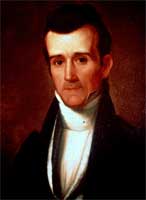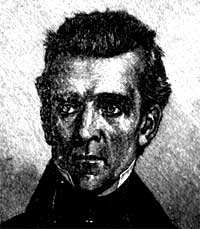James Knox Polk, the eleventh United States President (1845 - 1849), was born November 2, 1795 in Mecklenburg County, North Carolina. A lawyer with a successful practice, he served in the state legislature for two years and in the US House of Representatives for fourteen, the last four of which he functioned as the Speaker of the House. Polk is the only President to have served as Speaker. Because he was a protégé of Andrew Jackson's, he was nicknamed "Young Hickory." His policy of land expansion was called "manifest destiny", which we relate to the newspaper owner Horace Greely, who said "Go West young man."

When James was eleven, his family moved to Tennessee where his father operated a prosperous farm. As a child, Polk was very frail and experienced such poor health that formal schooling was impossible. When he was seventeen, his problem was diagnosed as gallstones, and a risky and painful surgery corrected the problem. Eighteen years old and unable to read or write, Polk made up for lost time. By the age of twenty he had passed the prerequisite test to enter the University of North Carolina. When he graduated in 1818 he was considered an all around scholar.

 Upon graduation, Polk returned home to Tennessee and practiced law in Nashville, but politics fascinated the young man, and he began to associate himself with leading public figures of the time. In 1820 he was admitted to the bar, and that same year was confirmed as a Democrat. Polk was a popular orator, a skill that furthered his aspirations. Upon graduation, Polk returned home to Tennessee and practiced law in Nashville, but politics fascinated the young man, and he began to associate himself with leading public figures of the time. In 1820 he was admitted to the bar, and that same year was confirmed as a Democrat. Polk was a popular orator, a skill that furthered his aspirations.
On January 1, 1824, during his tenure as State Senator, he married Sara Childress. Her family was socially prominent and her skills as his official hostess helped him to become recognized. Polk was a very difficult person to get along with, and Sarah's ability to smooth things over was immensely helpful to his career. Andrew Jackson was one of his personal friends who encouraged him and helped advance his political career.
From the State House Polk went on to serve in the United States House of Representatives, where he served from 1825 to 1839, when he left the House to serve as Tennessee's Governor. During his tenure, he became Speaker of the House. He was the only President who had served as Speaker of the House. He was known for his political support of Andrew Jackson's policies while he was President.

When Polk attended the convention of 1844, he had not intended to seek the presidency. He felt there were many other more prominent politicians who could serve. As it turned out, the Democratic party needed someone who could run a campaign on the issues and not personality, and James Polk was selected as the man who could do this. He was the first "dark horse" candidate for the presidency from a major party. The leaders thought he could bring about more understanding between the legislative and executive branches and could help make the nation function better.
 As President, Polk would start work at 6 am every morning, and it was not unusual for him to work late into the night. At the age of forty-nine he was the youngest elected President up to that time, and his legislative experience gave him the ability to get the job done. Polk believed it was the nation's "manifest destiny" to expand across North America. The nation's greatest territorial growth occurred while this President was in office. First, the annexation of Texas came as the result of a two-year war with Mexico, which also yielded California and all the territory eastward to the existing frontier. The Oregon compromise of 1846 had extended the northwest boundary. Polk worked well with Congress, and his era became known as the "Fabulous 40's." Not everyone benefited, however. Many social problems occurred during his term such as child labor hardships and slavery. As President, Polk would start work at 6 am every morning, and it was not unusual for him to work late into the night. At the age of forty-nine he was the youngest elected President up to that time, and his legislative experience gave him the ability to get the job done. Polk believed it was the nation's "manifest destiny" to expand across North America. The nation's greatest territorial growth occurred while this President was in office. First, the annexation of Texas came as the result of a two-year war with Mexico, which also yielded California and all the territory eastward to the existing frontier. The Oregon compromise of 1846 had extended the northwest boundary. Polk worked well with Congress, and his era became known as the "Fabulous 40's." Not everyone benefited, however. Many social problems occurred during his term such as child labor hardships and slavery.

He was not terribly well known when he came into office, nor is he rated as one of the greatest of all the Presidents; but he approached the presidency more methodically than many and accomplished much. Unlike some Presidents, he dominated his Cabinet and ruled his staff. He worked well with Congress, as he was one of their own, and thus legislation could be more easily worked out. He was one of the few Presidents who carried out every item of his political program. During his Presidency, the Golden Age of American Literature began with authors Poe, Hawthorne; Whittier; Emerson; Thoreau; and Longfellow.
After his departure from the White House, James Polk went back to his home in Nashville where three months later he died.
|

